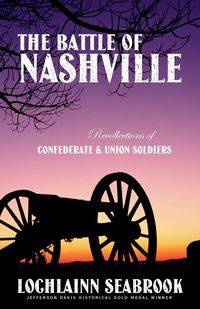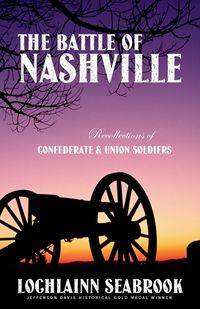The Battle of Nashville - Seabrook Lochlainn
- Recollections of Confederate and Union Soldiers
The consequences of the Battle of Nashville, which took place December 15-16, 1864, are still being debated, but one thing is certain: the Union victory there marked a major turning point in the War of 1861. After losing three battles in a row, including Spring Hill (November 29) and Franklin (November 30), Confederate General John Bell Hood and his troops were forced to flee southward, leaving the all-important region of Middle Tennessee largely under Union control. Confederate power in the Western Theater had been vanquished, for as Yankees loudly and proudly proclaimed, they had "crushed the backbone of the rebellion," a victory that helped lead to Lee's surrender at Appomattox just a few months later.
There are serious problems with this simplistic view, however. The Union win at Nashville was not "a remarkable display of Northern military skill," nor was the Confederate defeat "an illustration of the inferiority of Southern generals," as we have been taught. For one thing, the North had 82,000 soldiers at Nashville, the South a mere 20,000. In addition to a four-to-one numerical advantage, the North had unlimited funds, weaponry, ammunition, clothing, and food, while many of Hood's men were starving, coatless, and barefoot.
As for the so-called "Rebellion," the Right-wing South idolized the Union and the U.S. Constitution, for both were largely a creation of early Southern Conservatives, such as George Washington, James Madison, Thomas Jefferson, and George Mason. Therefore Dixie had absolutely no reason to "rebel" against the United States itself. What she was actually protesting and challenging was the Left-wing takeover of Washington, D.C., which commenced with the election of Liberal demagogue Abraham Lincoln (the political platforms of the Republicans and Democrats were reversed in the 1860s), who - eagerly supported by GOP-backing socialists and communists - publicly stated that he was willing to violate the Constitution in order to implement his progressive policies (this promise Lincoln officially began fulfilling on April 15, 1861). Furthermore, the Confederate Cause was not slavery, racism, or treason, as our history books falsely preach. It was, and still is, conservatism, a principle that is stronger and more vibrant today than ever before. Clearly "the backbone of the rebellion" was not "crushed" at Nashville!
So what are the facts about this famous conflict? In his small but powerful book The Battle of Nashville: Recollections of Confederate and Union Soldiers, award-winning author and historian Colonel Lochlainn Seabrook allows those who were there (among them many of his Confederate cousins) to answer this question. After reading the 30 eyewitness accounts he provides, the reader will have a much better understanding of the conflict, of the battles that led up to Nashville (which was never meant to be fought), and even of the War itself. Illustrated with rare images and generously footnoted, Col. Seabrook also includes a thought-provoking introduction, battle statistics, 19th-Century maps, a pertinent appendix, and a comprehensive bibliography. The Battle of Nashville is part of Col. Seabrook's trilogy, "Hood's Tennessee Campaign" series, which includes his popular companion books The Battle of Spring Hill and The Battle of Franklin. All three are available in paperback and hardcover.
Currently the author and editor of 100 scholarly books, Col. Seabrook's other titles include: Abraham Lincoln Was a Liberal, Jefferson Davis Was a Conservative; Lincoln's War: The Real Cause, the Real Winner, the Real Loser; Confederate Monuments: Why Every American Should Honor Confederate Soldiers and Their Memorials, and the international blockbuster Everything You Were Taught About the Civil War is Wrong, Ask a Southerner!
EAN: 9781943737734




The consequences of the Battle of Nashville, which took place December 15-16, 1864, are still being debated, but one thing is certain: the Union victory there marked a major turning point in the War of 1861. After losing three battles in a row, including Spring Hill (November 29) and Franklin (November 30), Confederate General John Bell Hood and his troops were forced to flee southward, leaving the all-important region of Middle Tennessee largely under Union control. Confederate power in the Western Theater had been vanquished, for as Yankees loudly and proudly proclaimed, they had "crushed the backbone of the rebellion," a victory that helped lead to Lee's surrender at Appomattox just a few months later.
There are serious problems with this simplistic view, however. The Union win at Nashville was not "a remarkable display of Northern military skill," nor was the Confederate defeat "an illustration of the inferiority of Southern generals," as we have been taught. For one thing, the North had 82,000 soldiers at Nashville, the South a mere 20,000. In addition to a four-to-one numerical advantage, the North had unlimited funds, weaponry, ammunition, clothing, and food, while many of Hood's men were starving, coatless, and barefoot.
As for the so-called "Rebellion," the Right-wing South idolized the Union and the U.S. Constitution, for both were largely a creation of early Southern Conservatives, such as George Washington, James Madison, Thomas Jefferson, and George Mason. Therefore Dixie had absolutely no reason to "rebel" against the United States itself. What she was actually protesting and challenging was the Left-wing takeover of Washington, D.C., which commenced with the election of Liberal demagogue Abraham Lincoln (the political platforms of the Republicans and Democrats were reversed in the 1860s), who - eagerly supported by GOP-backing socialists and communists - publicly stated that he was willing to violate the Constitution in order to implement his progressive policies (this promise Lincoln officially began fulfilling on April 15, 1861). Furthermore, the Confederate Cause was not slavery, racism, or treason, as our history books falsely preach. It was, and still is, conservatism, a principle that is stronger and more vibrant today than ever before. Clearly "the backbone of the rebellion" was not "crushed" at Nashville!
So what are the facts about this famous conflict? In his small but powerful book The Battle of Nashville: Recollections of Confederate and Union Soldiers, award-winning author and historian Colonel Lochlainn Seabrook allows those who were there (among them many of his Confederate cousins) to answer this question. After reading the 30 eyewitness accounts he provides, the reader will have a much better understanding of the conflict, of the battles that led up to Nashville (which was never meant to be fought), and even of the War itself. Illustrated with rare images and generously footnoted, Col. Seabrook also includes a thought-provoking introduction, battle statistics, 19th-Century maps, a pertinent appendix, and a comprehensive bibliography. The Battle of Nashville is part of Col. Seabrook's trilogy, "Hood's Tennessee Campaign" series, which includes his popular companion books The Battle of Spring Hill and The Battle of Franklin. All three are available in paperback and hardcover.
Currently the author and editor of 100 scholarly books, Col. Seabrook's other titles include: Abraham Lincoln Was a Liberal, Jefferson Davis Was a Conservative; Lincoln's War: The Real Cause, the Real Winner, the Real Loser; Confederate Monuments: Why Every American Should Honor Confederate Soldiers and Their Memorials, and the international blockbuster Everything You Were Taught About the Civil War is Wrong, Ask a Southerner!
EAN: 9781943737734

